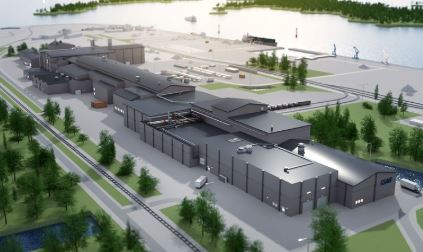SSAB secures additional €430 million in green financing for Luleå project
by David Fleschen

Swedish steelmaker SSAB has secured an additional €430 million in green financing to support the company’s major transformation project in Luleå. The funding, backed by the German Export Credit Agency Euler Hermes, complements earlier financing packages and completes the funding framework required for the planned transition to low-emission steel production in northern Sweden.
The Luleå transformation involves the construction of a state-of-the-art mini-mill with an annual production capacity of 2.5 million tonnes. The facility will include two electric arc furnaces, advanced metallurgy, and integrated rolling capabilities, as well as cold rolling, galvanizing, and annealing lines. The project aims to position SSAB Europe as a producer of higher-value steel products while significantly reducing both costs and carbon emissions.
The total investment in the Luleå project is estimated at €4.5 billion. The newly announced loan brings the total green financing to €2.7 billion, structured under the Green Loan Principles and SSAB’s Green and Sustainability-linked Finance Framework. Crédit Agricole CIB served as the Global Coordinator and Green Loan Coordinator.
The complete financing package includes:
-
A SEK 15 billion syndicated loan backed by the Swedish National Debt Office (Riksgälden),
-
A €808 million loan supported by the Italian export credit agency SACE,
-
A SEK 1.15 billion loan from the Nordic Investment Bank (NIB),
-
The newly added €430 million syndicated loan supported by Euler Hermes.
“This final piece of the financing marks a key milestone in our transformation journey,” said Leena Craelius, CFO of SSAB. “It reflects strong support from our partners and the investment in Luleå will enable us to build an even stronger and more competitive SSAB by reducing costs, accelerating product mix improvements and virtually eliminating CO₂ emissions from Luleå production.”
The Luleå site currently operates on blast furnace-based production, which will be phased out once the new mini-mill becomes operational. According to SSAB, this transition is expected to reduce Sweden’s national CO₂ emissions by approximately 7%.
The new facility will be capable of using a flexible mix of raw materials including fossil-free sponge iron, pig iron, and recycled scrap. In addition to reducing environmental impact, SSAB highlights expected benefits such as improved responsiveness to market demand, shorter delivery lead times, and overall increased efficiency.
Soure and Photo: SSAB

